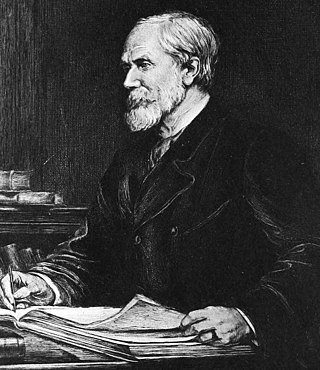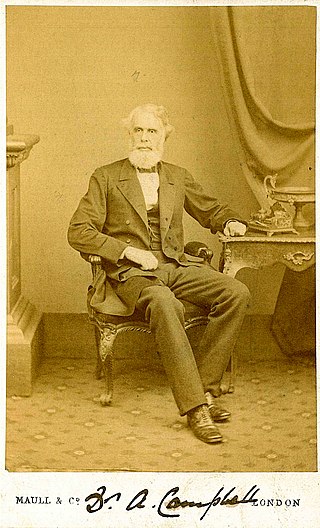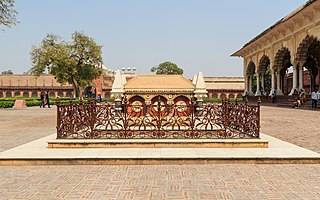Related Research Articles

The East India Company (EIC) was an English, and later British, joint-stock company that was founded in 1600 and dissolved in 1874. It was formed to trade in the Indian Ocean region, initially with the East Indies, and later with East Asia. The company gained control of large parts of the Indian subcontinent and Hong Kong. At its peak, the company was the largest corporation in the world by various measures and had its own armed forces in the form of the company's three presidency armies, totalling about 260,000 soldiers, twice the size of the British Army at certain times.

Colonel Sir Henry Yule was a Scottish Orientalist and geographer. He published many travel books, including translations of the work of Marco Polo and Mirabilia by the 14th-century Dominican Friar Jordanus. He was also the compiler of a dictionary of Anglo-Indian terms, the Hobson-Jobson, with Arthur Coke Burnell.

Ghanshyam Das Birla was an Indian businessman and member of the Birla Family.
Annie Henrietta Yule, Lady Yule was a British film financier and a breeder of Arabian horses. She co-founded the British National Films Company and Hanstead Stud, and commissioned the superyachts of her day.

Around 500 BC, the Mahajanapadas minted punch-marked silver coins. The period was marked by intensive trade activity and urban development. By 300 BC, the Maurya Empire had united most of the Indian subcontinent except Tamilakam, which was ruled by the Three Crowned Kings. The resulting political unity and military security allowed for a common economic system and enhanced trade and commerce, with increased agricultural productivity.
Sir David Yule, 1st Baronet was a Scottish businessman based in British India. The Oxford Dictionary of National Biography judged him "arguably the most important businessman in India" and quoted his obituary in The Times as "one of the wealthiest men, if not the wealthiest man, in the country".

George Yule was a Scottish merchant in England and India who served as the fourth President of the Indian National Congress in 1888 at Allahabad, the first non-Indian to hold that office. He was the founder of George Yule & Co. of London, and headed Andrew Yule & Co., of Calcutta. He served as Sheriff of Calcutta and President of Bengal Chamber of Commerce.

Andrew Yule & Co. Ltd. is an Indian central public sector undertaking under the ownership of the Ministry of Heavy Industries, Government of India. It is currently headquartered in Kolkata, and has offices in the main Indian cities. The majority of the products and services offered by the cpsu's subsidiaries are related to heavy industry and engineering.

Archibald Campbell of the Bengal Medical Service was the first superintendent (1840-1862) of the sanatorium town of Darjeeling in north east India. He also took a great interest in ethnology, economic botany and the study of the region and wrote extensively in the Journal of the Asiatic Society of Bengal under the name of "Dr Campbell" or "Dr A. Campbell" which has led some authors to misidentify his first name as Arthur or even Andrew. Campbell is credited with the introduction of tea cultivation in Darjeeling and for playing a role in the early experiments on the cultivation of Cinchona. Campbell corresponded with numerous naturalists including B.H. Hodgson and Sir Joseph Hooker. The latter travelled around Sikkim with Campbell on an expedition in which the two were held prisoner by Tsugphud Namgyal, the local ruler. This incident led to the British annexation of the Sikkim Terai region.
The Stotts were a family of architects from Oldham, North West England, of Scottish descent who specialised in the design of cotton mills. James Stott was the father, Joseph and his elder brother Abraham Stott had rival practices, and in later years did not communicate. Their children continue their practices.

Sir Henry John Stedman Cotton, had a long career in the Indian Civil Service, during which he was sympathetic to Indian nationalism. After returning to England, he served as a Liberal Party Member of Parliament (MP) for Nottingham East from 1906 to January 1910.

Murrays' Mills is a complex of former cotton mills on land between Jersey Street and the Rochdale Canal in the district of Ancoats, Manchester, England. The mills were built for brothers Adam and George Murray.

Synthomer plc, formerly known as Yule Catto & Co, is a British-based chemicals business. It is listed on the London Stock Exchange.

The Colvin family is the family descended from James Colquhoun Colvin (1767–1847), the son of Alexander Colvin (1718–1791) and Elizabeth 'Bettie' née Kennedy (1714–1795). James was a merchant trading between London and Calcutta during the East India Company. This Anglo-Indian family was intimately involved with the British Raj, first as traders and then as administrators and soldiers. Their descendants continued in service to the British Empire and later in some of its constituent countries.
Scottish-Indians are Indian citizens of mixed Indian and Scots ancestry or people of Scottish descent born or living in India. Like Irish Indians, a Scottish-Indian can be categorized as an Anglo-Indian. Scottish Indians celebrate Scottish culture, with traditional Scottish celebrations like Burns Night widely observed among the community.

John Anderson Graham was a Scottish minister and the first missionary from Young Men's Guild sent to North Eastern Himalayan region Kalimpong—then in British Sikkim, currently in West Bengal.
Jardine, Skinner and Company was a trading company based in Calcutta, India. It was founded in 1825, initially dealing in textiles. Later it branched out into opium, tea, timber and petroleum. The company was closely associated with Matheson & Company of London and Jardine Matheson & Co. of Hong Kong.
The Hanstead Stud was a breeding farm in England for Arabian horses. It was active from 1928 to 1957, and its animals had a significant impact in many countries, "second only in importance to" Crabbet Arabian Stud. It was based at Hanstead Park, a country house estate near St Albans in Hertfordshire, not far from London.
Yule, also Youell, Youle, Youll or Yuill, is a surname generally of British origin. Yule as a name is derived from the pagan festival of the same name, used for those born at Christmas time.
The Wallace brothers were the six sons of Edinburgh architect Lewis Wallace. In varying combinations, the brothers established themselves as one of the leading nineteenth century East India merchants, trading in cotton, tea, coffee and other commodities. Through their investments in Burma, they became the world's leading exporter of teak. The rise of independent governments after World War II meant the progressive loss of the family's Eastern assets and the redeployment of capital back to London. This capital was used in the 1960s to establish Wallace Brothers as a banking house but this strategy did not long survive the secondary banking crisis of 1973-75.
References
- 1 2 3 4 5 Yule Newsletter no. 23 (1998)
- ↑ "Obituary – Andrew Yule". The Times. No. 36828. London. 24 July 1902. p. 10.
- ↑ Sir David Yule
- ↑ Richard Davenport-Hines, 'Yule, Annie Henrietta, Lady Yule (1874/5–1950)’, Oxford Dictionary of National Biography, Oxford University Press, 2004; online edn, May 2006 accessed 17 Dec 2013